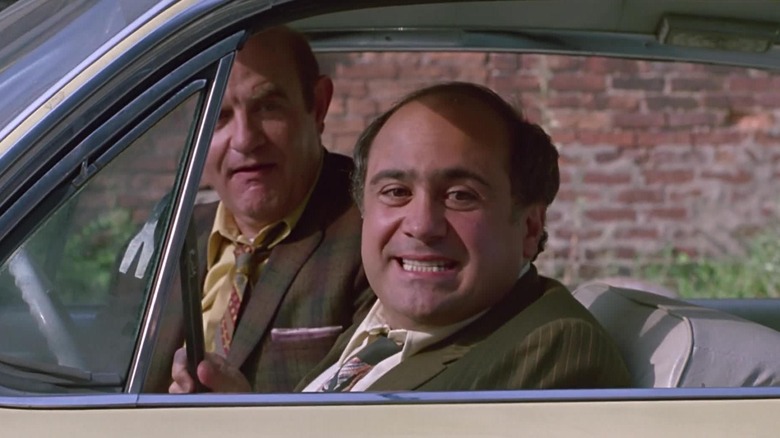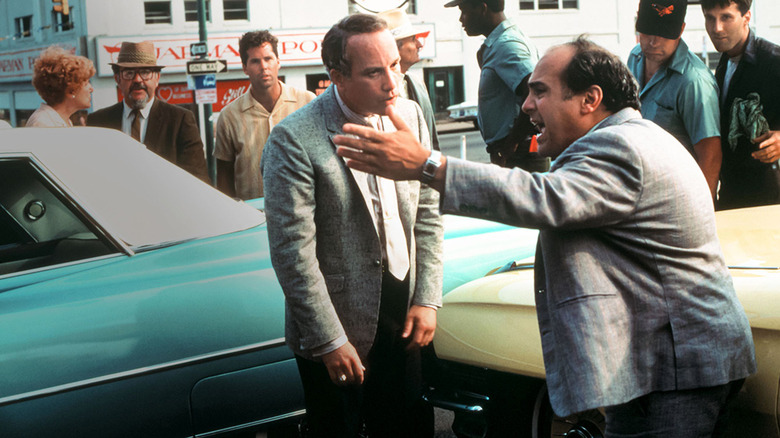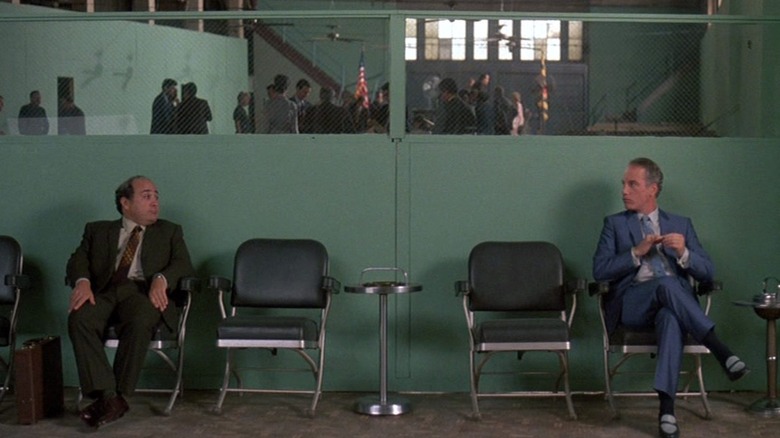Steve Buscemi Failed His Audition For This Danny DeVito Comedy With 82% On Rotten Tomatoes
Steve Buscemi is one of those actors who seems ubiquitous, having racked up over 100 movie and TV credits and even become the subject of an evergreen meme ("How do you do, fellow kids?") on his way to becoming a national treasure. He put in the hard yards after making the transition from firefighting to acting, landing a variety of bit parts in the mid 1980s and working the club circuit as part of a duo with Mark Boone Junior. Gradually, he found his niche, playing quirky, fast-talking little guys for the likes of Martin Scorsese (the "Life Lessons" segment of "New York Stories"), Jim Jarmusch ("Mystery Train"), and the Coen Brothers ("Miller's Crossing" and "Barton Fink"). Then came the big breakthrough role that put him on everyone's map as serial complainer and sole survivor Mr. Pink in "Reservoir Dogs."
Funnily enough, his career might have taken off earlier if he had landed a role in "Tin Men," a Danny DeVito-led comedy with an impressive 82% rating on Rotten Tomatoes. The film is an engaging period piece from Baltimore native Barry Levinson, the writer-director whose tetralogy of movies set in the Maryland metropolis began with his Hollywood calling card, "Diner." Set four years later, Danny DeVito and Richard Dreyfuss star in "Tin Men" as Ernest Tilley and "B.B" Babowsky, two rival aluminum siding salesmen who come into direct conflict when they get into a fender bender. This sets into motion a spiraling game of tit-for-tat as they take revenge on each other's prized Cadillacs. Eventually, B.B. seeks final victory by romancing and seducing Tilley's discontented wife Nora (Barbara Hershey), a ploy that backfires spectacularly as Tilley is happy to get divorced and B.B. accidentally falls in love with her.
Coming after two less personal projects ("The Natural" and "Young Sherlock Holmes"), "Tin Men" was a return to the winning format of Levinson's hometown debut, a neatly acted and observed comedy-drama featuring lengthy scenes of regular guys sitting around shooting the breeze. Considering Buscemi grabbed so many viewers' attention with a similar diner scene at the start of "Reservoir Dogs," he would have been well-suited to play alongside DeVito, Dreyfuss, and the gallery of familiar mugs that Levinson assembled for his supporting cast. But, thanks to a flunked audition, it wasn't to be.
Steve Buscemi's failed Tin Men audition
Buscemi revealed how he often had problems making the right connection with directors while talking to Stephen Colbert on "The Late Show." Discussing his audition for "Tin Men," the actor explained that he had prepared very hard for the role rather than simply "winging it" like he often did at the time. After his first reading, Buscemi recalled Levinson giving him notes and asking him to try something slightly different. Unfortunately, he ended up delivering the dialogue in exactly the same way as his first attempt. "Needless to say, I did not get that part," Buscemi added.
Luckily, Buscemi's failure to land the role and a few other audition disasters didn't harm his long-term career prospects. Since moaning about his color-coded nickname in "Reservoir Dogs," Buscemi has made a big impact in movies like "Fargo," "The Big Lebowski," and "Ghost World," as well as appearing in everything from massive Hollywood blockbusters like "Armageddon" to highly-acclaimed TV shows like "Boardwalk Empire" (the latter of which even stopped him from quitting acting for good).
As for "Tin Men," casting is one of the film's major benefits, and while it would have been nice to see Buscemi in there, it does just fine without him. DeVito's career really boomed in the mid-'80s after establishing himself initially as a character actor, and he's in good form as the hapless Tilley, an earthy chancer who is stuck in the middle of a terminal losing streak both at work and at home. In the other corner, B.B. is a flashy smooth talker with a penchant for women, cars, and silk suits, and Dreyfuss' aloof style is a nice contrast to DeVito's bustling everyman. Arguably, the movie could have done with the stars sharing more scenes, as their moments together really crackle with humor and nervous energy.
Aside from the male leads, Hershey gives the film's best performance despite being stuck in a neglected housewife role. We really feel her exasperation and hurt as she becomes a pawn in the two men's battle of egos. Supporting the main trio is a colorful cast of familiar faces, including John Mahoney, Bruno Kirby, J.T. Walsh, and Seymour Cassel. There isn't much to distinguish their characters from one another, but it's always a pleasure to spend time in this kind of company.
Is Tin Men worth your time?
Released in March 1987, "Tin Men" was perhaps overshadowed by Levinson's next two hits. At Christmas time that year, he oversaw Robin Williams riffing his way to an Academy Award nod for "Good Morning, Vietnam," and followed that up by taking home the Best Director Oscar for helming "Rain Man" to Best Picture-Winning glory. Levinson never quite reached such heights again, and "Tin Men" feels very modest by comparison, zooming in on the world of middle-aged salesmen in early 1960s Baltimore.
That hyper-specificity happens to be the film's major strength. Levinson grew up around this type of blue-collar hustle, and it shows in how he writes and directs his tin men. It's a macho boys' club, and he nails the casual and confrontational rhythms of male bonding, whether it's guys mulling over the latest episode of "Bonanza" or Tilley and B.B. agreeing to shoot a game of pool to decide who wins Nora. Much like Scorsese's semi-autobiographical "Mean Streets," Levinson takes an almost anthropological viewpoint, neither trying to make his male characters seem cool nor disapproving of their foibles. He clearly knows these people in his heart, and he simply shows them as they are.
As a result, "Tin Men" is a little too classy and introspective to push the revenge comedy hook to its fullest and most entertaining extreme. DeVito was doing a lot of that stuff in the '80s, like "Ruthless People" and "The War of the Roses" — if you go in expecting more of the same, you'll probably come away disappointed. Instead, Levinson is more concerned with the passing of an era, as symbolized by the compact Volkswagen Beetles that keep popping up like pimples in a sea of Cadillac tail fins.
Our two warring protagonists sense a change is coming, but don't know how to grab hold of it as they face investigation for dodgy sales practices. "Tell me, where's it written in the Constitution that says you can't hustle for money?" Tilley complains at one point, and he's half-right. The United States is a country built on hustle, and Levinson follows in the footsteps of two Pulitzer Prize-winners that tackled this aspect of the American Dream: Arthur Miller's midcentury masterpiece "Death of a Salesman" and David Mamet's "Glengarry Glen Ross." "Tin Men" isn't close to matching either, but it is still an enjoyable few hours hanging out in Levinson's neighborhood.


